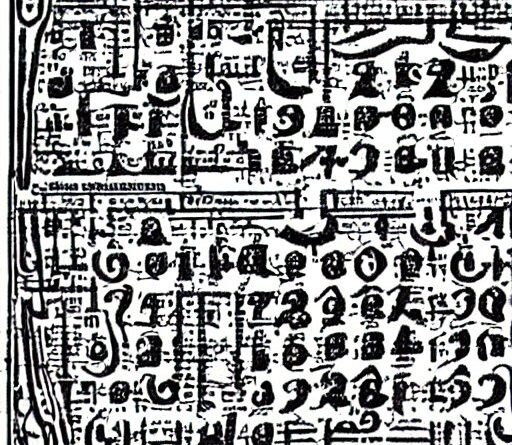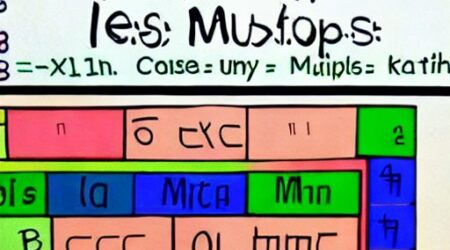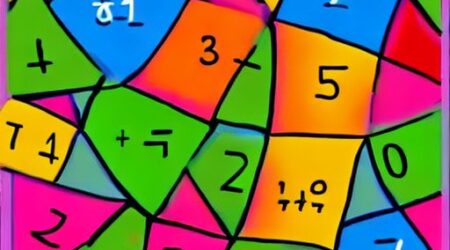Tracing the Origins of Mathematical Wonders: A Journey Through History
Welcome to our journey through the fascinating history of mathematics. In this blog post, we’ll explore the origins of mathematical concepts and ideas, taking you on a tour from ancient civilizations to modern discoveries. We’ll discuss how mathematics has evolved over time and highlight some of the most significant figures and moments in math history. So, let’s embark on this exciting adventure and uncover the secrets behind the numbers.
Section 1: The Beginnings – Ancient Mathematics
Our journey starts with the ancient civilizations of Babylon, Egypt, and Greece, where the foundations of mathematics were laid. These early mathematicians used math to solve practical problems such as measuring land, predicting astronomical events, and creating calendars.
Discover how the Babylonians developed a sophisticated number system and made significant contributions to algebra and geometry.
Learn about the Rhind Mathematical Papyrus, one of the oldest known mathematical texts, and how the Egyptians used math to build their impressive pyramids.
Explore the contributions of famous Greek mathematicians like Euclid, Archimedes, and Pythagoras, who laid the groundwork for modern geometry and number theory.
Section 2: The Golden Age of Mathematics – Islamic Scholars and Medieval Europe
Mathematics flourished during the Islamic Golden Age, as scholars from the Islamic world made groundbreaking advances in algebra, trigonometry, and number theory.
Delve into the life and works of Al-Khwarizmi, the Persian mathematician who introduced algebra to the world and developed the concept of algorithms.
Learn how Leonardo Fibonacci introduced the Hindu-Arabic numeral system to Europe and explore his famous sequence of numbers.
Section 3: The Renaissance and Beyond – The Birth of Modern Mathematics
The Renaissance saw a resurgence in mathematical exploration, leading to the development of new mathematical concepts and the formalization of existing ideas.
Explore the life and works of René Descartes, whose groundbreaking ideas laid the foundation for modern analytical geometry.
Discover how Isaac Newton and Gottfried Wilhelm Leibniz independently invented calculus, a revolutionary tool that transformed mathematics and science.
Section 4: The 20th Century – The Age of Mathematical Revolution
The 20th century witnessed remarkable advancements in mathematics, from the formulation of new theories to the solution of centuries-old problems.
Unravel the mysteries behind Kurt Gödel’s groundbreaking incompleteness theorems, which changed our understanding of mathematics forever.
Learn how Andrew Wiles solved the elusive Fermat’s Last Theorem, a 358-year-old mathematical enigma that had stumped mathematicians for centuries.
Section 5: Women in Mathematics – Breaking Barriers
Throughout history, women have made invaluable contributions to the field of mathematics, often overcoming significant obstacles to achieve recognition.
Discover the story of Hypatia, the ancient Greek mathematician and philosopher who was a trailblazer for women in the field.
Explore the life of Ada Lovelace, a visionary mathematician who is credited with writing the world’s first computer algorithm.
Delve into the groundbreaking work of Emmy Noether, a brilliant mathematician whose contributions to abstract algebra and theoretical physics continue to shape our understanding of the world.
Conclusion:
Our journey through the history of mathematics has taken us from the earliest civilizations to modern breakthroughs, highlighting the many brilliant minds who have shaped this fascinating field. As we continue to push the boundaries of mathematical knowledge, we honor the legacy of these trailblazers and look forward to the discoveries that lie ahead.
Section 6: The Impact of Technology on Mathematics
As technology has advanced, so has the field of mathematics. Computers and the internet have revolutionized the way we approach and solve complex mathematical problems.
Learn how computers have transformed the field of mathematics, enabling mathematicians to tackle problems previously deemed unsolvable.
Explore how the internet has fostered collaboration among mathematicians worldwide, leading to breakthroughs and discoveries that might have otherwise remained elusive.
Section 7: Mathematics in Our Daily Lives
Mathematics is not just an abstract field of study; it permeates every aspect of our lives, from the technology we use to the way we perceive and interact with the world.
Discover the numerous ways math plays a role in our day-to-day lives, from managing finances to understanding patterns in nature.
Explore the aesthetic appeal of mathematics and how the elegance of mathematical concepts can inspire art, architecture, and more.
Conclusion:
Our exploration of mathematics’ rich history and its impact on our lives has highlighted the power and beauty of this ever-evolving field. As we continue to uncover new mathematical concepts and make groundbreaking discoveries, we are reminded of the importance of mathematics in shaping our understanding of the world around us.
Section 8: Unsolved Mysteries – The Future of Mathematics
Despite centuries of progress, there are still many unsolved problems and mysteries in mathematics. These open questions serve as a driving force for the field, inspiring mathematicians to push the boundaries of human knowledge.
Learn about the seven most famous unsolved problems in mathematics, which carry a prize of $1 million each for their solution.
Explore the potential avenues of research in mathematics and how future discoveries could reshape our understanding of the universe.
Conclusion:
As our journey through the world of mathematics comes to an end, we are reminded of the field’s incredible depth, history, and potential for future breakthroughs. The ongoing pursuit of mathematical knowledge is a testament to human curiosity and our desire to understand the complex tapestry of the universe. As we celebrate the achievements of the past, we eagerly anticipate the discoveries that lie ahead, and the ways in which mathematics will continue to shape our world.
Section 9: Mathematics Education – Nurturing the Next Generation
As we appreciate the achievements and progress made in the field of mathematics, it’s essential to consider how we can inspire and nurture the next generation of mathematicians.
Discover the various pedagogical approaches used in teaching mathematics, from traditional methods to more progressive, student-centered techniques.
Learn about the importance of fostering a growth mindset in students, and how teachers and parents can cultivate a love for mathematics in young minds.
Conclusion:
The history and progress of mathematics underscore the importance of quality education and mentorship. As we look to the future, we must prioritize the nurturing of young mathematical talents and ensure that the next generation is well-equipped to tackle the challenges and mysteries of the mathematical world.








Leave a Reply